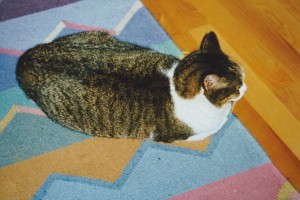This is the third in a series of posts about a remarkable non-human person, Fidel, a charismatic, handsome, utterly black cat who is now 18 years old and is one of the most remarkable people in my life.
The same summer that he drove the trespassing dog down to the town road and to wherever overly-assertive, discourteous dogs end up, he showed another dimension of his approach to family and to decency.
We had taken in Conchita, who had been a waif on the streets of Paris before my niece adopted her. Eventually, Conchita emigrated to the U.S. with my niece and after some years, for a variety of reasons, moved in with us.
That summer, she was about 22 years old and finally starting to show signs of age. She kept her coat immaculate and retained incredible hand-speed (as prize-fighters say), but her hearing and vision were fading. This meant that she had a hard time keeping up with the rest of us when we went on long inter-species walks in the woods.
Fidel, about one year old when Conchita started living with us, had immediately established a close relationship with her. He demanded grooming from her, butting his big head against her face, and he groomed her in return. He curled against her when they slept. While he wrestled rough and tumble with Pogo and was a superb hunter, he played with Conchita most gently, at a kinetic level she could endure and enjoy at her venerable age.
We lived well out in the country, and often took long woods walks with the three cats — a great joy for hominids and felids alike. On such walks, the hominids generally walk steadily, with some destination in mind; the felids cover more ground yet take longer because they detour on many side trips and pause to examine smells along the way. One result is that the hominids are generally 100 feet or more ahead of the cats, who travel in sprints to catch up and then get distracted and fall behind again.
At first, Conchita loved our walks, but after a few years she began to have a hard time keeping up. It was not a matter of pace but of navigation: she couldn’t hear where we were, couldn’t see where we’d gone. Feeling lost, she’d start yapping with anxiety. We’d hear these barks well behind us, through the trees, but usually didn’t stop; we figured we’d find her again on the way back.
But Fidel went back for her. While the rest of us — several humans and Pogo — continued on, Fidel would retrace our trail, greet and reassure Conchita, and tenderly encourage her to proceed along the line of march. After the first time, he took on this role for every walk.
He was a very young cat, yet he had already had achieved this fine understanding of familial dynamics. Some of us are older and slower, some are more impatient than others, some of us are humans, others of us are cats. And he had chosen his role within those dynamics; he established compassion and inclusivity as the ruling principles of our interspecies community.
This inclusivity expanded as needed. We lost several cats to fisher-cats, a savage weasel relative the size of a small dog — perfectly designed for murder, a shark of the forest — and thus at times introduced new cats to the household. Fidel’s approach to frightened newcomers was to come up, introduce himself even if the other cowered away, and then begin grooming the stranger. If they resisted, he’d put a weighty arm over their back so they couldn’t go anywhere, and work them over until their fur shone.
And they got the message: This is a peaceable kingdom. You’re in the ‘hood now, and we take care of our own.
One big heart does indeed tend to nurture other big hearts; with Fidel among us, the cat demographic of our house has been exceptionally happy and harmonious. And the lessons to be learned from his great heart are many; I mention more in the fourth and final post about Catus Fidelius Veritas, pending.
.


